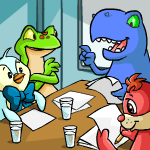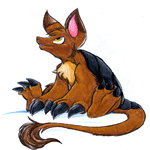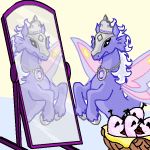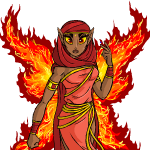 How To Be Creative (And Make Neopoints Off It)
by kahlen369
--------
If you’ve got a talent for bringing Neopets (and Petpets too!) to life using your words or your drawings, then you’ve got quite an opportunity to show off these gifts and get rewarded for it at the same time. Now, I’m not talking anything shady, like drawing or writing stuff for other players and getting Neopoints (or rare items) in return, because that’s against the rules, and you wouldn’t want to get frozen, would you? What I’m talking about is the kind of creativity that will put you on the news page---and not in a bad way. To put it bluntly now, I’m talking about the various creative contests available for you to join! Because of how active and awesome the Neopets community is, there are quite a few contests going on for you to choose from, from the Beauty Contest to the Mystery Picture, but for the sake of making the most buck off your bang (see what I did with that quote there?), we’ll be focusing on the ones that give you Neopoints and items on top of a trophy. For people terrible at flash games (which is everyone, it seems, if the boards aren’t lying to me), this can be your ticket to that rare paintbrush, because, lo and behold, said paintbrushes are one of the possible prizes you can win! It’s all random, unfortunately, so you are equally likely to get a fairly cheap petpet for your troubles instead, but for the chance, isn’t that enough to try? This illustrious list consists of the Storytelling Contest, the Caption Contest, the Poetry Gallery, and the Art Gallery. Now, the Caption Contest is still down at the moment, so we’ll be focusing on the other three instead. Both the Storytelling Contest and the Poetry Gallery focus on the written word, but in two very different forms. Storytelling involves prose, while Poetry involves, well, poetry. Generally, if you have a knack or love for one, you’d be interested in the other too (just to see the difference, at the very least), but there are also those who prefer to stick to only one. There’s nothing wrong with this, because it’s important to know yourself and your strengths and to play to it. To know that, we’ll have to take a closer look at each contest and see which you qualify for. The Poetry Gallery is said by some to be the easiest of the three, because just about anyone can write poetry, supposedly. Now, I agree with this sentiment in general, but with the amendment that although it is the easiest to enter, it is the hardest to win. This is because while it is, indeed, very easy to write poetry, it is very hard to write good poetry. Also, the fact that this is easy to enter means that more people will enter, making competition fiercer (at least in quantity) compared to the other two. With all this mind, how can you win? First, let’s start with the basics. I’m not going to explain what poetry is, or what constitutes it, because that’s a rather complex topic depending on how deep you want to get into it and I still have two other contests to write about. Instead, I’ll try to describe what constitutes good poetry, and makes it different from bad poetry. Now, personal taste is a factor in this, and certain people will have their preferences skewed towards a certain type of poetry, but in general, all good poems have at least some, if not all, of these markers. Good poetry flows well. Have you ever heard or seen the old cliche of the Neopet in a beret, dramatically reading his poetry to a beat? All cliches have a root in truth (that rhymed, by the way), and there’s certainly a reason why the picture for the art gallery when you look it up on the contests page has a Neopet with a paper in hand speaking out loud. Poetry is meant to be spoken, so it needs to flow really well, or it will just sound awkward or disjointed, and the poor poet will end up pelted with potatoes. The easiest way to test this, of course, is to simply read your poem out loud. Make sure you read it more than once, and in different ways. Doing this will also help you see which parts need to be altered as well as the general feel you are going for. This leads us to our next point, which is, good poetry has a point. All good writing needs to have a purpose, otherwise, it’s boring and annoying to read. Nobody wants to read the story that goes around in circles with no plot progressing (this point will be repeated when we get to the Storytelling Contest), and no one wants to read the poem that just seems to ramble on and on, for no reason at all. While rhyming is important to poetry (it helps with flow, after all), it’s important that you don’t sacrifice the content of your poem in your quest to get that perfect rhyme at the end. There’s always free-verse, after all, and slant or half rhyme (that is, a type of rhyme formed by words with similar but not identical sounds). Related to this, I go to my third point, which is, rhythm. This is related to flow (notice how all these points are related to each other?), because a good rhythm flows well, and vice versa. Now, since these two words are synonyms, you might think I’m just splitting hairs, and they’re the same thing. But, flow and rhythm differ in an important aspects. To use a metaphor, flow is like the river flowing smoothly, while rhythm is the rocks in its path that determines its course. This also leads me to my last and final point. Good poetry has vivid imagery. Because poems are much shorter compared to prose, it’s very important that you get a clear picture of its point quickly (which is why it needs to have all the other things above too). Using tools like metaphors and similes help a lot, and are basically cheating in a way, because you don’t have to describe the actual scenario in detail, which will cut down on your ever important length (25 to 75 lines long is ideal, according to the official guide). Just make sure you pick a good comparison, and one that isn’t super commonly used, because there are tons of other poems being submitted and you want to stand out. Like I said, there are a lot of entries to this one, and most of them, no offense, are not good poetry. If you can manage to achieve the basic parameters I have set above, you’re already a cut above the rest! A quick tip, though, is that it is best to submit poetry related to theme days. They like to choose poems with a connecting theme, even when not on theme days, but since they won’t tell you what that theme will be, it’s easiest to just write for one you do know. Next, we move on to prose. The Storytelling Contest is actually rather unique in this regard, because you are not the only writer here (and I don’t just mean in entries!). This contest is basically a round robin, which is a type of story where people take turns writing each part and what comes next, typically without consulting the other writers. Because this involves so many people (and these are just the winners, mind you), a bit of people skills comes into play here. By that, I simply mean that it’s important for you to understand what the people before you have written down (so no worries, all you socially awkward Meepits out there). This doesn’t apply if you are the first to write the story (yes, you can do that now---just submit it regularly after the current contest has ended), because you’ll get to decide the general plot, mood and themes involved. But for everyone else, it’s important to analyze what comes before you (a good tip in writing and in life, really). First understand what genre the story is going for. Is it a comedy, a mystery or an adventure? Because the tropes involved in each one are very different and you wouldn’t want to misuse one. It’s also important to know where you are in the story. If you are near the beginning, don’t start throwing your giant spinning tops of doom into the story just yet! You need to work on setting up the tops first. The plot diagram is your best friend here. Knowing if you are at the beginning, conflict, rising action, climax, falling action and resolution, will guide you in what you need to write next. No matter the genre, all stories generally follow this same sequence. If you are in the beginning, you need to work on the setting, while the conflict, as its name suggest, introduces the problem the story needs to solve. The rising action basically takes that problem and expands on it, basically showing why and how much of a problem this is, while the climax is when the problem and the people trying to solve it finally engage in a thrilling final battle. Because we don’t want any tragedies befalling our poor Neopets, the problem typically gets solved by our heroes (and not the villains), which is when our falling action occurs. This is basically the aftermath of the battle, along with the resolution, which typically involves a short epilogue showing what happened next for our beloved characters after the fact. Now, if you keep these factors in mind, it will be much easier to write a good entry that will get picked. It’s important to make your entry belong in the overall story, but also to make it unique and stand out amongst all the other entries that have been submitted so far. This is a delicate line to balance, so it may take more than one try before you succeed (but succeed you will… eventually). The last contest (though it’s not labelled as such) is the Art Gallery. It focuses on art, as its name implies. Unlike the Beauty Contest, the Art Gallery’s winner are determined by TNT staff, which means your ability to make friends on the Neoboards and advertise your entry like a pro are non-factors here, and your actual artistic capabilities are now more in question. That’s not to say that if you can’t draw, you can’t win. No, a quick look through past winners should tell you that it’s totally possible for people who aren’t naturally gifted to get the gift of a win here. In fact, it’s been said that being too good might even be a hindrance instead of a curse (so beautiful it’s a curse, is the trope used here). Basically, there’s only a certain level of talent that will get accepted into this hall of fame, and all you need to do is look through past winners to get a gauge for it. Generally, happy, cute fluff works better than your serious dramatic masterpieces here (though exceptions occurs, of course). It’s most important, I think, to get the spirit of Neopets in your work. Obviously, this depends a bit on what you are actually drawing. When picking your muse, I would recommend you pick theme days as well, since this will give you a very good idea of when to check back to see if your work has been accepted. This is notable because, unlike Storytelling and Poetry, there’s no mail here, just 10,000NP added to your current balance and an item in your inventory, as well as, obviously, your entry being up on the page. Once your pick your topic, it’s important to get to know it. The official art is good for this, obviously, but don’t copy it entirely or directly, because you also want to put your own spin on it. You must achieve the Golden Mean (it’s a thing, look it up) between immediately recognizable for what it is, and just different enough that it’s recognizable as your work and not the TNT’s. Things like changing the pose or using different mediums help greatly on this point. If you are thinking this is all sounded like a lot of effort, that’s the point! It’s been noted that what the team looks for most in these entries is, well, effort. So, doing a quick little doodle isn’t recommended unless you are really that talented and just work really fast. For most of us mere mortals, art takes work, and that’s a good thing. Take the time you spend to make your drawing and enjoy it. Because, whether it gets chosen or not, you still get a cool drawing out of it that you made all on your own! Even if it doesn’t get put up in the Gallery, put it in your pet page instead, because you should be proud of what you’ve done and all the effort it took! On that point, I’d add that these contests are best for people who already enjoy writing poetry and prose, and making art, because the chances are, you won’t win on your first try, or every time, but if you like what you’re doing, you won’t mind. Of course, for people who aren’t so inclined at first, these contests might just be the opportunity for you to change your mind! So, I encourage everyone to try to enter these contests, at least once. You never know, you might win a paint brush worth over a million Neopoints on your first try!
| |
|
Search the Neopian Times
Great stories!
---------
 A Baby and a Brute: Part One A Baby and a Brute: Part One
The wind tore through the woods with a fearsome howl, rattling the leafless branches. Everything was white but it was far from a winter wonderland. A lone figure trekked through the deep snow...
by 77thbigby |
---------
 ALL HAIL SLOTH ALL HAIL SLOTH
“SLOTH! SLOTH! SLOTH!” the deformed Grundos chanted. “As you can see.. The Space Faerie can no longer protect Neopia as she is a little under the weather. So from now on I am the ruler of the Neopian universe,” Sloth said. Without any further word he dropped the mic and walked out.
Also by pikachewz
by grimmbones7 |
---------
 A Priceless Gem A Priceless Gem
She sighed. But l can't live my life in fear of talking to people! Mother wants me to take the throne someday, but how can I rule over a town if I'm forbidden from getting to know anyone?
She looked back, where Crystalluxe was watching Lillille in confusion from her bedroom door.
Maybe it's time…
by winter_pony4 |
---------
 Spiral: Part Two Spiral: Part Two
The group ceased any movement. The forest fell silent. Nearby, a glowing caught their focus. Wearing a frilly dress, and a neat bow, slowly, a wispy translucent Kacheek floated into the vicinity, a short distance away…
by waterguardianwmr |
|
|